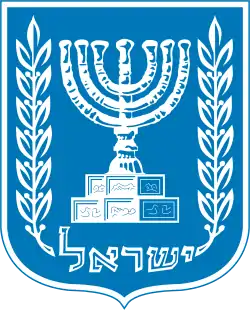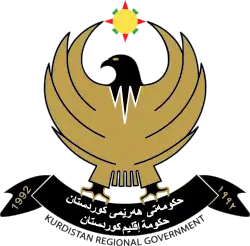Israel–Kurdistan Region relations
Israel–Kurdistan Region relations covers the diplomatic relations between Kurdistan Region of Iraq and the State of Israel.
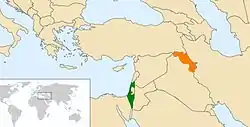 | |
Israel |
Kurdistan Region |
|---|---|
While diplomatic relations are not established, relations between the two entities have existed since the early 20th century.[1] Kurdistan Region stated that no issues exist between the two,[2] and Israel uttered support for an independent Kurdistan in 2017.[3] The relations between the two have been met with anti-Semitic and anti-Kurdish assertions from Arab, Iranian and Turkish leaders and media.[4][5]
History
The earliest attested interaction between Israel and the Kurds of Iraq was in 1931 when future director of Mossad Reuven Shiloah visited Kurdistan in disguise as a Hebrew teacher and journalist. There, he forged contacts and developed his vision on the Israeli relations with the non-Arab communities in the region.[6]
Aliyah through Kurdistan (1948-1949)
When Arab and Jewish relations deteriorated and most Jews fled Iraq in the late 1940s, the Iraqi Jews fled to Israel through Kurdistan with Israeli and Iranian support.[7][1] The Jewish Kurdish community in Israel would form the Israeli policy on the Kurds as they were the primary source of information for the state on Kurdistan and Kurds.[8]
Israeli-Kurdish relations (1958-1979)
As the only non-Arab state in the region, Israel formulated the "Doctrine of Periphery or Peripheral Strategy" which expressed that Israel needed to develop strategic relations with non-Arabs in the region which included Kurds, who not only were the largest non-Arab population in the region, but also resided over a strategic territory in Iraq which took part in the 1948 Arab–Israeli War. For this reason, began aiding the Kurdish Peshmerga against Iraq during First Iraqi–Kurdish War from 1958 through the 1970s. In 1959, the Kurdish leader Mustafa Barzani sent Kamuran Alî Bedirxan to Geneva where he met with Israel foreign minister Golda Meir who promised unconditional Israeli support for an independent Kurdistan.[9]
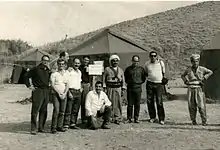
While hesitant at first and against Israeli presence in Kurdistan,[11] Iran and SAVAK were successfully convinced by Israel to assist the Kurds in 1961 and Israel was allowed to use the country as a conduit for its activities, which included the transportation of weapons and food. However the activities were secret and they even denied the support for the Kurds to the Americans.[12] The two countries also formed the Parastin, a Kurdish intelligence service to spy on the Iraqi army. Bedirxan met with Israeli officials again in 1964 and Israeli Prime Minister David Ben-Gurion authorized Mossad to supply money and anti-aircraft weapons to the Kurds. In May 1965, Israeli diplomat David Kimche and IDF General Tzvi Tzur visited Kurdistan and met with Barzani in Haji Omeran. The Israelis agreed to province large supply of weapons and funds to the Kurds who received the material by winter of 1965. Israel also aided with the improvement of Peshmerga tactics and played a significant role in the capture of Mount Handren which let to the killing of about 1400-2000 Iraqi soldiers.[13] Kurdish leader Barzani visited Israel twice, in 1968 and 1973.[14]
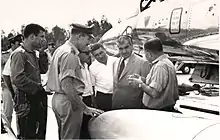
The Iranian-Israeli-Kurdish alliance continued until the Algiers Accords in 1975 wherein Iraq and Iran signed a peace treaty. The treaty resulted in frictions between Iran and Israel[7] since the latter wanted to continue supporting the Kurds and had spent the preceding years pressuring America to increase military assistance.[16] Israel considered the agreement a betrayal[17] and believed Iran would use the Kurds as a bargaining chip in its negotiations with Iraq.[18] Prime Minister Yitzhak Rabin uttered that "The Shah sold out the Kurds".[17]
From the Kurdish perspective, relying on Israel was beneficial to drag the United States in to the war. However, while Barzani supported the Israeli assistance, Jalal Talabani and Ahmed Barzani were against it.[9]
Both Mossad and SAVAK urged the Shah to re-evaluate his position on the Kurds of Iraq following the Algiers agreement and the trifecta gradually renewed in 1978.[19] The trifecta ceased to exist after the Iranian Revolution in 1979, however Israel still wished to maintain relations with the Kurds.[20]
During the Iraq–Iran war (1980-1991)
In 1982, Israeli official and former senior official at the Ministry of Foreign Affairs Oded Yinon published the Yinon Plan arguing that the Iran–Iraq War would split Iraq into three states which would be a strategic Israeli gain.[21] During the Gulf War and the concurrent uprisings, Israel sent large supplies of humanitarian aid through the Turkish border.[22]
"Plan B" (2000s)
After the 2003 invasion of Iraq, Israeli Prime Minister Ariel Sharon pushed for the expansion of relations with the Kurds and to establish 'a significant presence on the ground' in Kurdistan. This plan was called the "Plan B" by Israel. In June 2004, Seymour Hersh wrote an article for The New Yorker wherein he claimed that Israel was supporting the Kurds militarily to counteract Iranian proxies and that Israeli intelligence operatives were present in the region. While a CIA official acknowledged this claim, Israeli, Kurdish and American officials denied it.[23] In 2005, Yedioth Ahronoth reported that Kurdistan had received tons of Israeli-manufactured equipment and that Motorola Israel and Magal Security Systems trained the Peshmerga employing former Israeli soldiers. That same year, President of Kurdistan Region Masoud Barzani stated: "“[E]stablishing relations between the Kurds and Israel is not a crime since many Arab countries have ties with the Jewish state". In 2006, Israel condemned the BBC for filming Israelis training the Peshmerga. In 2008, Patriotic Union of Kurdistan leader Jalal Talabani met with Israeli Defense Minister Ehud Barak prompting severe criticism from Iraqi leaders.[24]
Kurdish Foreign Minister Falah Mustafa Bakir stated in 2010 that: "We have no problems with Israel. They have not harmed us. We can’t be hating them just because Arabs hate them."[2]
Relations since 2014
In June 2014, Israel accepted independently-sold Kurdish oil at Ashkelon Port despite criticism from Iraq.[25] Israeli officials stated that the country was keen on strengthening ties with Kurdistan to broaden its options for energy supplies.[26] On selling oil to Israel, Kurdistan stated they needed the revenue for the fight against ISIS.[25] In the same month, Prime Minister Netanyahu stated Kurds are a "fighting people who have proven political commitment and political moderation, and they are worthy of their own political independence."[27] In September 2014, Netanyahu further commented that Israel: "supports the legitimate efforts of the Kurdish people to achieve their own state."[28] After the Kurdish independence referendum in 2017, Netanyahu stated that there was a "deep natural longstanding sympathy" for the Kurds.[29]
In 2017, almost half of the oil extracted from Kurdish fields was exported to Israel. The buyers in Israel are mostly private companies who receive about 300,000 barrels of oil on average per day.[30]
Humanitarian aid
Assistance from Israeli NGOs in the 2010s
Following the ISIS offensive inti Northern Iraq, the Israeli NGO agency IsraAid announced to provide urgent assistance to Christians and Yazidis in Kurdistan Region, together with the American Jewish Committee.[31] In October 2014, IsraAID agency provided humanitarian supplies to refugees within Kurdistan Region, fleeing the ISIS campaign. IsraAid provided supplies to 1,000 families in Duhok towards the winter, including beds, baby milk and blankets. The IsraAid assistance was provided in collaboration with the Canadian ONEXONE agency and was coordinated with Kurdish authorities. Founding Director of IsraAid Shahar Zahavi told Arutz Sheva that the Israeli team were warmly received by the Kurdish residents of the camp.[32] By early 2015, IsraAid trucks provided 3,000 items to Dohuk in Kurdistan Region, helping Christian and Yazidi refugees.[33]
Bibliography
- Abramson, Scott (2018), A Historical Inquiry into Early Kurdish-Israeli Contacts: The antecedents of an alliance, 9, The Journal of the Middle East and Africa, pp. 379–399, doi:10.1080/21520844.2018.1548920
- Bengio, Ofra (9 November 2017). "Has Israel's Support for Kurdistan's Independence Helped or Harmed the Kurds?". Begin-Sadat Center for Strategic Studies (BESA). 637. Retrieved 3 February 2021.
- Bishku, Michael B. (2018), Israel and the Kurds: A Pragmatic Relationship in Middle Eastern Politics, 41, Journal of South Asian and Middle Eastern Studies
- Mamikonian, Sargis (2005), Israel and the Kurds (1949-1990), 9, Iran & the Caucasus, pp. 381–399
- Minasian, Sergey (2007). "The Israeli-Kurdish relations". 21st Century. 1.
- Reisinezhad, Arash (2018), The Shah of Iran, the Iraqi Kurds, and the Lebanese Shia, p. 357, ISBN 9783319899466
- Romano, David; Rojhilat, Shivan (2018), Danilovich, Alex (ed.), "Israel's periphery doctrine and the Kurds", Federalism, Secession, and International Recognition Regime: Iraqi Kurdistan, Routledge
References
- Abramson (2018), p. 381.
- Bishku (2018), p. 64.
- Halbfinger, David M. (22 September 2017). "Israel Endorsed Kurdish Independence. Saladin Would Have Been Proud". New York Times. Retrieved 1 February 2021.
- Minasian (2007), p. 25.
- Bengio (2017).
- Abramson (2018), pp. 383–384.
- Reisinezhad (2018), p. 42.
- Mamikonian (2005), p. 389.
- Reisinezhad (2018), p. 88.
- "כורדים וישראלים על רקע בי"ח שדה" (in Hebrew). Retrieved 2 February 2021.
- Reisinezhad (2018), pp. 88–89.
- Reisinezhad (2018), p. 126.
- Reisinezhad (2018), pp. 126–127 & 130.
- Romano & Rojhilat (2018), p. 172.
- "ביקור המולא באחת מטייסות חיל האוויר" (in Hebrew). Retrieved 1 February 2021.
- Reisinezhad (2018), p. 221.
- Reisinezhad (2018), p. 238.
- Reisinezhad (2018), p. 226.
- Reisinezhad (2018), p. 288.
- Mamikonian (2005), p. 96.
- Yinon, Oded (February 1982). Beck, Yoram (ed.). "אסטראטגיה לישראל בשנות השמונים" [A Strategy for Israel in the 1980s]. Kivunim (in Hebrew). 14: 49–59.CS1 maint: ref=harv (link)
- Minasian (2007), p. 11.
- Hersh, Seymour M. (21 June 2004). "As June 30th approaches, Israel looks to the Kurds". The New Yorker. Retrieved 1 February 2021.
- Bishku (2018), p. 63.
- Bishku (2018), p. 65.
- Payne, Julia (20 June 2014). "Israel accepts first delivery of disputed Kurdish pipeline oil". Reuters. Retrieved 1 February 2021.
- Bishku (2018), p. 66.
- Bishku (2018), p. 67.
- Bishku (2018), p. 71.
- Atkins, Jacob (13 October 2017). "Israel and Iraqi Kurdistan: the oil connection". i24 News. Retrieved 2 February 2021.
- "Israeli NGO delivers aid to refugees in Iraq". The Times of Israel.
- "Iraq: Israeli NGO Delivers Emergency Aid to Kurds - Middle East - News - Arutz Sheva". Arutz Sheva.
- "IsraAID scales up winter relief operation in northern Iraq 9 Feb 2015". GxMSDev.
